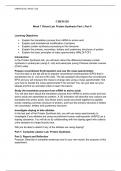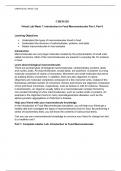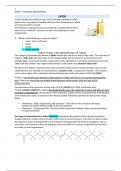KnowledgeBase
On this page, you find all documents, package deals, and flashcards offered by seller KnowledgeBase.
- 3981
- 0
- 631
Community
- Followers
- Following
172 Reviews received
4629 items

CHEM 120 Week 8 Assignment; Group Project Presentation - Vitamins & Minerlas
CHEM 120 Week 8 Assignment; Group Project Presentation - Vitamins & Minerlas
- Package deal
- Other
- • 15 pages •
CHEM 120 Week 8 Assignment; Group Project Presentation - Vitamins & Minerlas

CHEM 120 Week 8 Assignment; Group Project - Stoichiometry & Dosage Calculation (CO 4)
CHEM 120 Week 8 Assignment; Group Project - Stoichiometry & Dosage Calculation (CO 4)
- Package deal
- Other
- • 16 pages •
CHEM 120 Week 8 Assignment; Group Project - Stoichiometry & Dosage Calculation (CO 4)

CHEM 120 Week 8 Assignment; Group Project - Chemistry of Nutrition
CHEM 120 Week 8 Assignment; Group Project - Chemistry of Nutrition
- Package deal
- Other
- • 13 pages •
CHEM 120 Week 8 Assignment; Group Project - Chemistry of Nutrition

CHEM 120 Week 8 Assignment; Group Project - Chemistry of nutrition (CO 10)
CHEM 120 Week 8 Assignment; Group Project - Chemistry of nutrition (CO 10)
- Package deal
- Other
- • 11 pages •
CHEM 120 Week 8 Assignment; Group Project - Chemistry of nutrition (CO 10)

CHEM 120 Week 7 Virtual Lab; Protein Synthesis Part I, Part II
Learning Objectives • Explain the translation process from mRNA to amino acid • Explain post-translational modification of proteins • Explain protein synthesis processing in the ribosome • Explain the primary, secondary, tertiary and quaternary structures of protein • Explain the basic principles of mass spectrometry (MALDI-TOF) Introduction In the Protein Synthesis lab, you will learn about the difference between protein synthesis in prokaryote (using E. coli) and eukaryote (us...
- Package deal
- Other
- • 3 pages •
Learning Objectives • Explain the translation process from mRNA to amino acid • Explain post-translational modification of proteins • Explain protein synthesis processing in the ribosome • Explain the primary, secondary, tertiary and quaternary structures of protein • Explain the basic principles of mass spectrometry (MALDI-TOF) Introduction In the Protein Synthesis lab, you will learn about the difference between protein synthesis in prokaryote (using E. coli) and eukaryote (us...

CHEM 120 Week 7 Virtual Lab; Introduction to Food Macromolecules Part I, Part II
Learning Objectives • Understand the types of macromolecules found in food • Understand the structure of carbohydrates, proteins, and lipids • Detect macromolecules in food samples Introduction Macromolecules are very large molecules created by the polymerization of small units called monomers. Most of the macromolecules are present in everyday life, for instance in food.
- Package deal
- Other
- • 3 pages •
Learning Objectives • Understand the types of macromolecules found in food • Understand the structure of carbohydrates, proteins, and lipids • Detect macromolecules in food samples Introduction Macromolecules are very large molecules created by the polymerization of small units called monomers. Most of the macromolecules are present in everyday life, for instance in food.

CHEM 120 Week 7 Discussion; Flow of Genetic Information - Protein
1. Choose a specific biomolecule found in your diet. What is the source and purpose of this biomolecule?
- Package deal
- Other
- • 1 pages •
1. Choose a specific biomolecule found in your diet. What is the source and purpose of this biomolecule?

CHEM 120 Week 7 Discussion; Flow of Genetic Information - Genetics in Forensic Science
Week 7 Discussion: Flow of Genetic Information Genetics in forensic science Option 2: Genetics is a rapidly evolving area of science. Each year advances in genetics bring exciting new technologies to the market. Areas such as forensics, genealogy, and healthcare have all been affected by new genetic technologies. Choose a genetic technology and report on how this technology is affecting or will affect our lives. Give at least one outside source and cite in APA format.
- Package deal
- Other
- • 2 pages •
Week 7 Discussion: Flow of Genetic Information Genetics in forensic science Option 2: Genetics is a rapidly evolving area of science. Each year advances in genetics bring exciting new technologies to the market. Areas such as forensics, genealogy, and healthcare have all been affected by new genetic technologies. Choose a genetic technology and report on how this technology is affecting or will affect our lives. Give at least one outside source and cite in APA format.

CHEM 120 Week 7 Discussion; Flow of Genetic Information - Controversial Genetic Technology Known as Sex Selection.docx
CHEM 120 Week 7 Discussion; Flow of Genetic Information - Controversial Genetic Technology Known as Sex S
- Package deal
- Other
- • 1 pages •
CHEM 120 Week 7 Discussion; Flow of Genetic Information - Controversial Genetic Technology Known as Sex S

CHEM 120 Week 7 Concepts; Biochemistry
In this concept, we will discuss one class of biological polymers called lipids or fats. You might be familiar with this class of biopolymers, which are found in butters and oils. We will discuss saturated and unsaturated fats, and what those terms mean for the molecule's structure as well as its properties at room temperature. 1. Which of the following is a source of lipids?
- Package deal
- Other
- • 35 pages •
In this concept, we will discuss one class of biological polymers called lipids or fats. You might be familiar with this class of biopolymers, which are found in butters and oils. We will discuss saturated and unsaturated fats, and what those terms mean for the molecule's structure as well as its properties at room temperature. 1. Which of the following is a source of lipids?

NRNP 6531 Week 10 Knowledge Check; Musculoskeletal Conditions and Neurologic Conditions (Summer 2021).docx
BIO 220 Topic 1 Quiz
MATH 534 Week 7 Course Project, Final Part C; Regression and Correlation Analysis
NURS 6002 Week 3 Assignment; Part 3 - Strategies to Promote Integrity and Professional Ethics
NR 631 Week 6 Discussion; Planning and Scheduling (Initial Post, Responses)